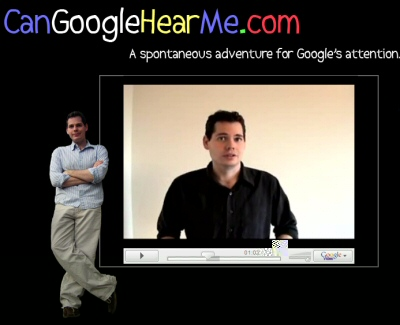Is there an emerging YouTube demographic? Politically-themed music videos may be offering an unacknowledged glimpse at the next generation of voters. But judging from these clips, their real message might be that elections are stupid, and what's really important is who's got the funniest music videos.
This summer famously saw debating candidates facing questions from a cartoon-voiced talking snowman, and Barack Obama's inspiring "Yes I Can" speech eventually morphed into a hip music video. But at the same time, though Barack lost Ohio's primary, he won the support of a whopping 75 percent of voters under the age of 24. If America's future will ultimately be determined by YouTube, it's these young video stars who are running the secret campaign.
So what is the new generation trying to tell us?
1. Hillary Boy
Not only is she mandating universal healthcare for millions — but YouTube user DaveDays also has a crush on her.
He admits candidly in the second verse that "I don't have political views," but states that 60-year-old Hillary has still won his support because of "Those thighs, those eyes. Yeah, yeah, yeah..."
Using doctored footage showing Hillary winning a dance contest, he implies that Barack Obama can't win because his own supporters' videos are insufficiently sexy. "Obama Girl you're a skank," sings Days, warning his sexy video rival that she can't ensure an Obama victory "even if you take off all your clothes." Such is the devotion of this Green Day wannabe (with the Republican mom) that he'd even choose to watch Hillary instead of the Teletubbies. Which kind of puts the whole primary in perspective...
Day's real interest is becoming a video star — as he himself acknowledges in the video's description.
"This is a spoof of obama girls vid.." he scribbles.
dont take it too seriously ;-)
Unfortunately, only 900,000 people have watched his video, putting his efforts slightly behind Taryn Southern's own lesbian-themed video about her own crush on the candidate, "Hott 4 Hill." ("I know you're not gay, but I'm hoping for bi-") But together they've created a visual, musical, sexually-charged dialogue — which is entirely free of any actual political issues.
2. The Obama Girl Revolution
In November "Obama Girl" recorded a public service announcement arguing America's political system suffered from one longstanding dysfunction: public servants who can't dance. The video was viewed just 135,659 times, suggesting that 25-year-old model Amber Lee Ettinger had already fallen from her earlier fame.
As the original video figurehead, Barely Political's "Obama Girl" launched the craze for political musical videos back in June of 2007, though there's no evidence it impacted the campaigns. HCD Research later discovered that the responses reported most-frequently for her famous video were "irritated" (48%) and "embarrassed" (35%). There's even something vaguely fascist about her newest music video, released Tuesday, in which she wails to Hillary to surrender because "it's become an Obama nation."
Ironically, all that crushing didn't actually lead her to vote for Obama. According to a February post on a New York Times blog, Obama Girl skipped the New Jersey primary after a weekend of partying at the Super Bowl.
And she didn't vote for anyone.
3. Viva!
There's a positive side to political music videos. The dialogue has been democratized, with every voice claiming a part of the internet for its own message. Miguel Orozco, a Mexican-American Obama supporter born in East L.A., created Amigos de Obama.com "to fill a void in media outreach to Latinos" according to a message on his site. ("Tu Voto Tiene Swing!" it welcomes visitors...)
The site also displays one of the most sincere music videos, one that actually hopes to persuade voters — in this case, the crucial hispanic demographic — using a mariachi band. "Viva Obama!" the corridos sing...
"Families united and safe and even with a health care plan... His struggle is also our struggle, and today we urgently need a change..."
"Out of many, we are truly one," Barack announced last week in a speech about race — and it seems true even the world of viral music videos. Elsewhere on the web, there's even a video called Barack OBollywood.
4. "Oh my god! No!!!"
In an age of music videos, the worst sin is bad production values. The video Hillary4U&Me became viral simply because it was so bad, and ultimately it even provoked a YouTube counter-meme: the horrified reaction video. ("Oh my god! No! That is horrible! Ah ha ha ha ha ha! Are you serious?!" screams YouTube user CloudIzMe, as his friends gather around laughing in derision.) User "UltimateJosh" attempted to inject some edge by creating a metal "Rock Remix" by replacing the soundtrack with Marilyn Manson's "Better of Two Evils."
"I will step on you on my way up, and I will step on you on my way down...")
The music videos have evolved into post-modern deconstructive "meta" videos. But we still don't know which candidate has the best healthcare proposal.
5. McCain-o-mania
How long until John McCain feels compelled to record his own music video? The answer came in 2002, when the 65-year-old former prisoner of war appeared on Saturday Night Live to sing a medley of Barbara Streisand songs.
"I've been in politics for over 20 years," he tells the audience, "and for over 20 years I've had Barbara Streisand trying to do my job..."
As the tables turned, the young writers at Saturday Night Live thought they were writing a satire. But instead they'd stumbled into a harbinger of the strange future to come, when music and politics would collide into a near-meaningless jumble of amateur glory hounds.
Though it still remains to be seen who they'll vote for.
See Also:
Democratic Cartoon Candidates
YouTube 5 Sorriest Questions for the 2008 Presidential Candidates
5 Best Videos: Animals Attacking Reporters
5 More Nasty Campaign Ads
Pulp Fiction Parodies on YouTube
